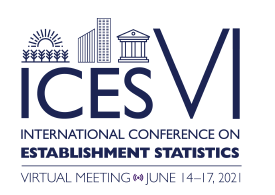All Times ET
Program is Subject to Change
TBD
The Impact of Persistent Measurement Error on Survey Estimates (308038)
Joanna Fane Lineback, U.S. Census Bureau*Chin-Fang Weng, U.S. Census Bureau
Keywords: selective editing, automatic editing, periodic surveys, imputation, bias, variance
In this presentation, we examine the impact of persistent measurement error on survey estimates. The accuracy of survey estimates is highly dependent on the quality of reported data. However, reported data may be subject to error from various sources, including poorly designed questions, reporting errors, and keying errors. If these errors are not corrected at the editing stage, where possible errors are identified and replaced, then the problem persists into imputation and could ultimately impact survey estimates. At the imputation stage, the edited - but not necessarily error-free - data often serve as covariates to predict missing values. Therefore, these errors may be accumulating over time in ways we do not fully understand. Specific to periodic establishment surveys, small errors regularly may be overlooked in favor of errors that contribute more to estimates of totals. To examine the long-term impact of persistent measurement error, we apply various editing and imputation scenarios to real stock market price data with simulated measurement errors and missing values. Bias and coefficient of variation are used to assess the quality of the adjusted estimates.
